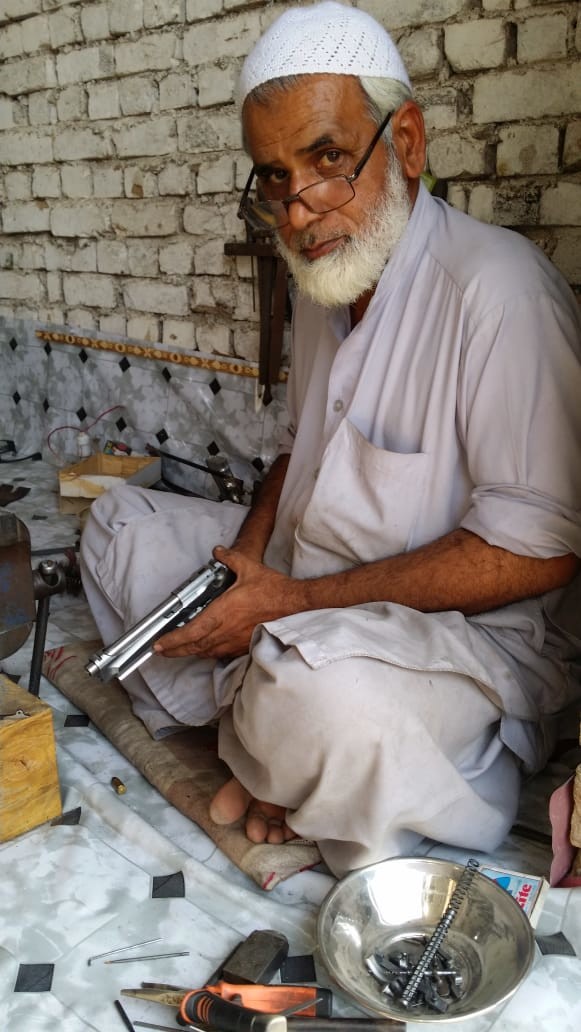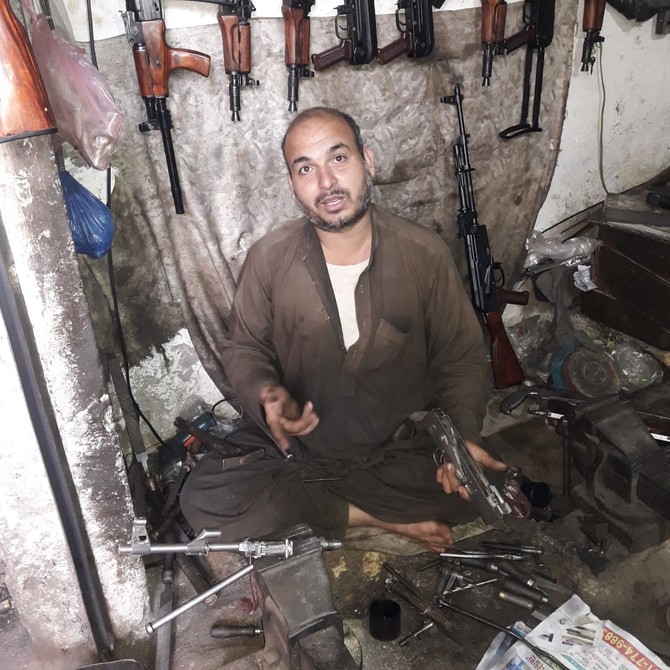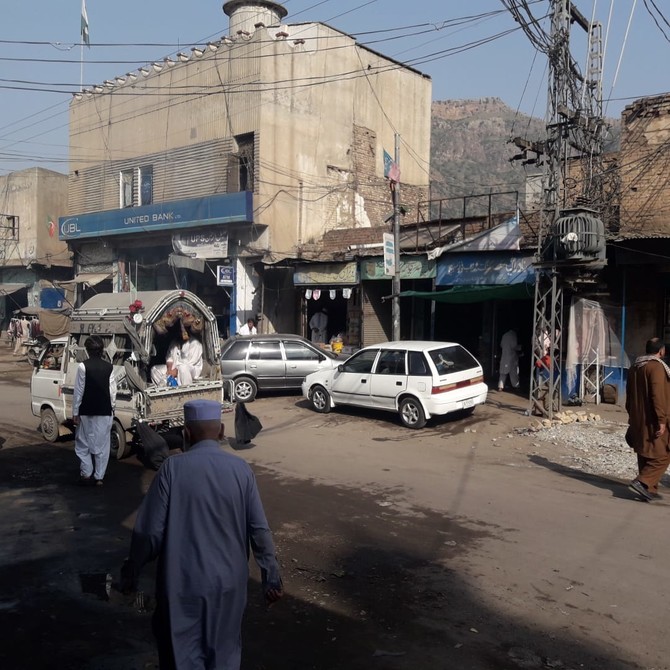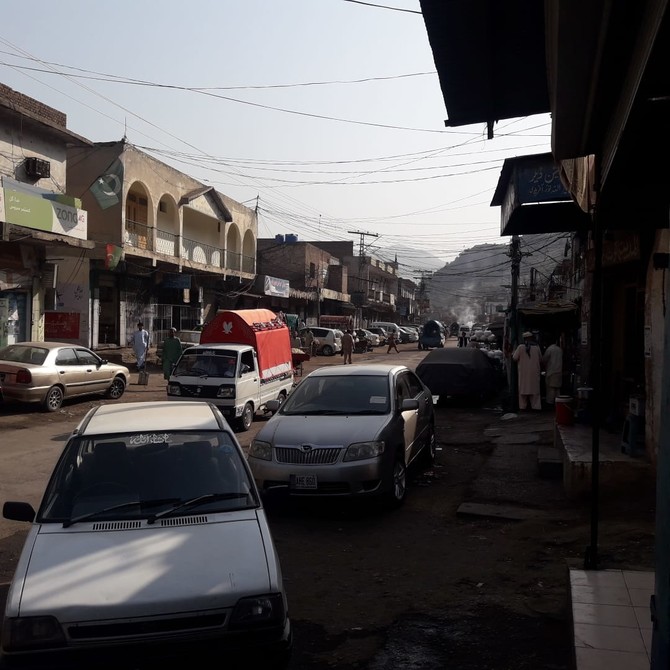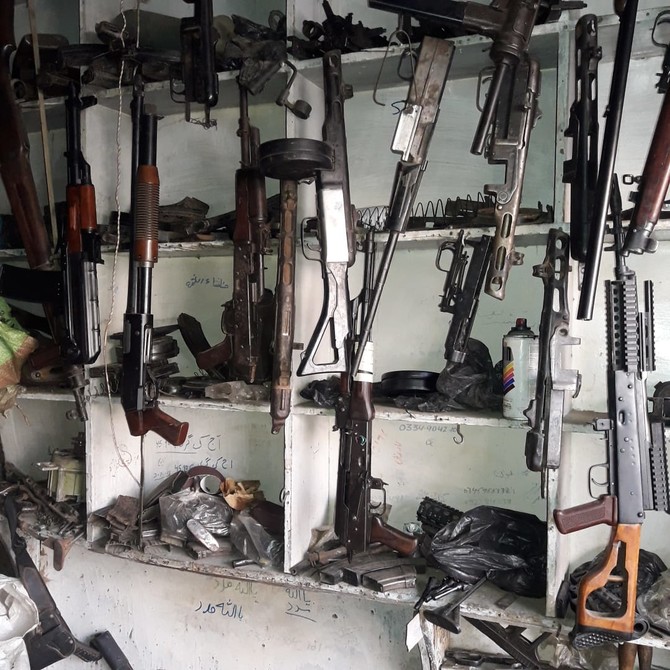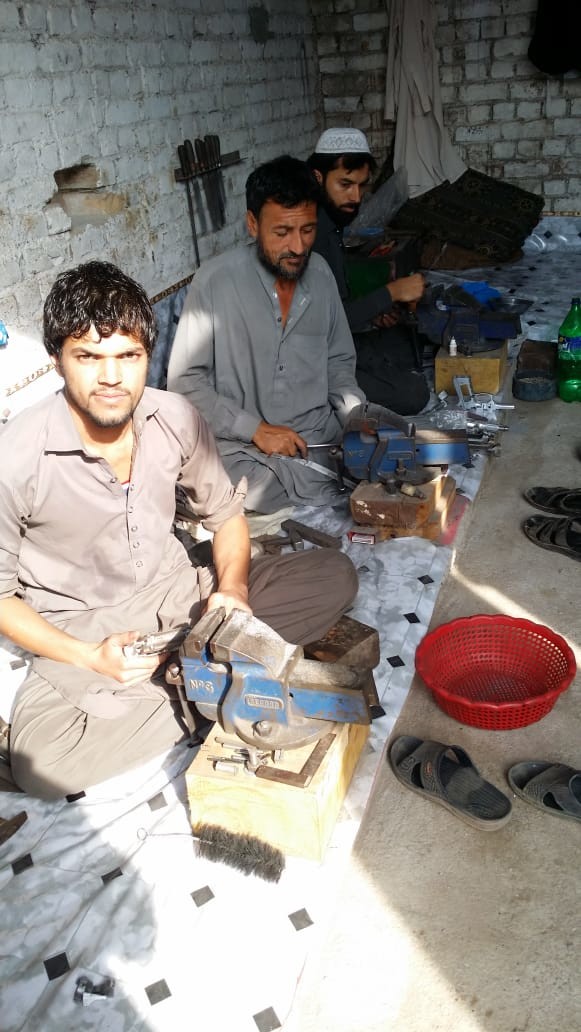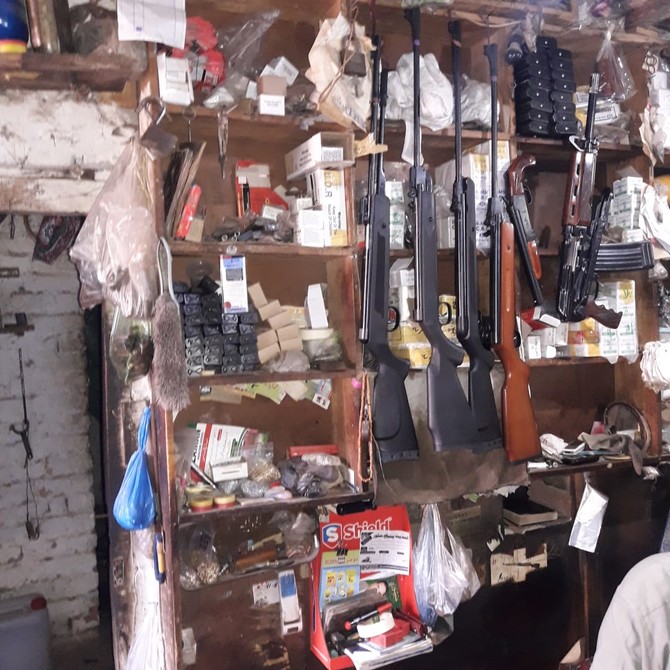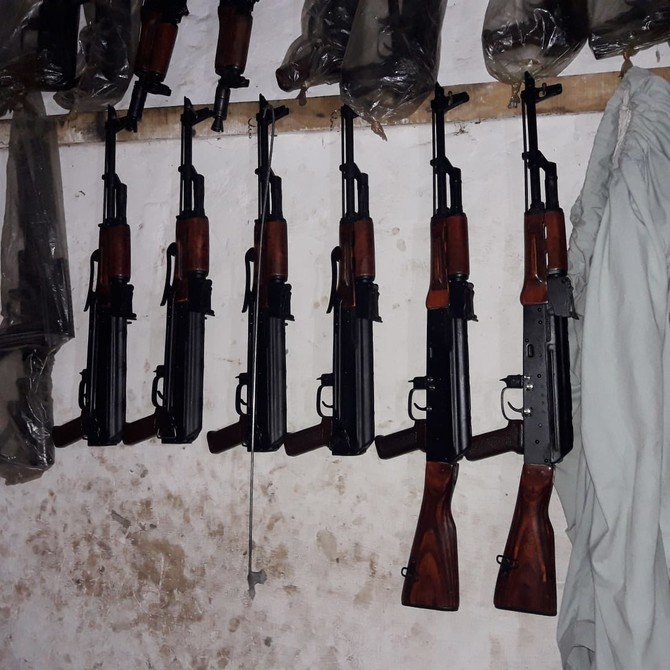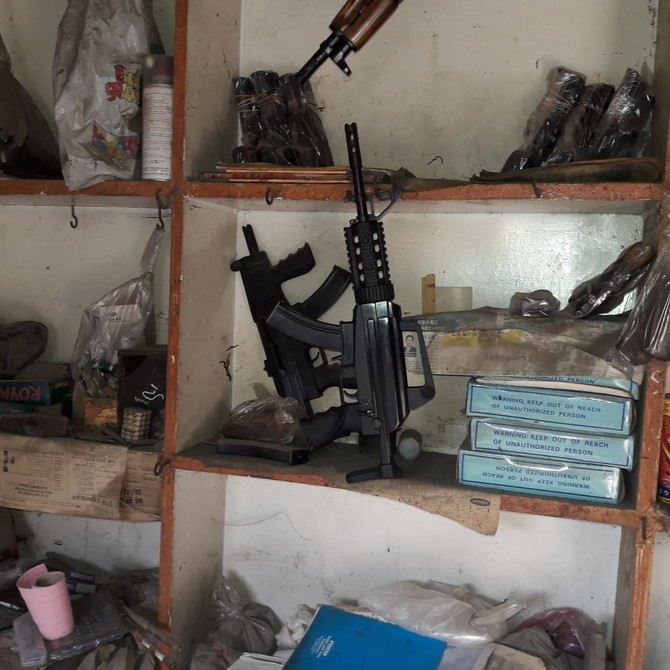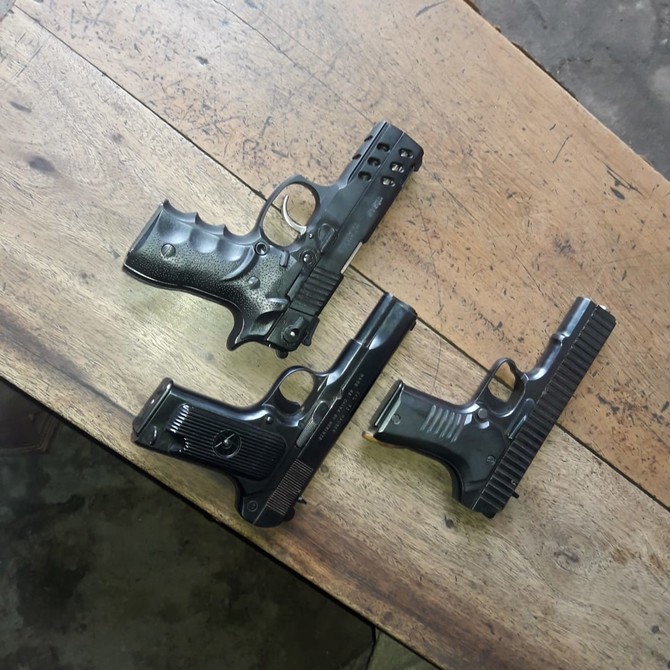DARA ADAM KHEL: It’s all guns and no roses for the shop owners of the weapons market that lines the bazaar in the dusty hamlet of Dara Adam Khel.
Inhabited by the Afridi tribe, the market has become the core identity of Dara Adam Khel — an area located between Kohat and Peshawar to the south of the Khyber Pakhtunkhwa province.
On any given day, it is packed with traders and merchants who have gained recognition for the quality and range of their guns and ammunition, with a number of tribesmen starting their businesses from scratch and soldiering on to become millionaires.
During an extensive range of interviews, where they spoke exclusively to Arab News, a majority shied away from taking credit for their craft, reasoning that they were only paying homage to skills passed on by their ancestors by taking the business forward.
Dating back to the pre-independence era of Pakistan, ancestors of these tribesmen — during their armed expedition in large swathes of Asia — learned the skills, passing it on to the future generations who developed it into a full-fledged arms industry in the Khyber tribal region.
Today, 40,000 to 50,000 residents of the area – with a total population of 110,000 — are directly associated with the industry, with every second owner saying that he inherited the business from his ancestors.
Quoting his great-grandfather, Kamran Afridi, a leading arms dealer from the area, said that members from the tribe used to form a Lashkar (armed resistance group) to fight the British imperial powers in parts of the Federally Administered Tribal Area, prior to 1947.
“There were times when tribal elders sent armed expeditions to parts of the sub-continent while the British forces used to come here to invade. Those types of armed clashes led them to learn ordnance and weapon-making skills, primarily from the Britishers. Then, our forefathers started replicating those skills when they would return from missions abroad,” Kamran said.
He added that while initially, it was a very tedious and slow-moving process to repair and manufacture small guns at their residential quarters or hujras; in time, his predecessors learned to develop their skills and eventually set up shops, hiring experienced and untrained laborers.
Later in the 50s, a few gunsmiths arrived from Punjab who were technically-trained in the craft and demonstrated comparatively-advanced methods of repairing and polishing second-hand weapons.
“Currently, according to my assessment, 6,000- 7,000 skilled laborers such as gunsmiths and professional manufacturers with technical expertise are involved in the arms hardware and ammunition-making process,” Kamran said, adding that, today, craftsmen from the market boast an incomparable expertise by being adept at assembling any type of weapon, on demand, with the help of a mere sketch.
The most popular items on sale include the 9-MM, 30-Bore guns, Repeaters, Kalashnikov and M-16 rifles. However, the industry prefers to manufacture non-prohibited weapons specifically for license holders, he said.
And while all the weapons are locally made, some hardware parts — such as springs and other items – are either sourced from Afghanistan or imported from western countries. However, according to Kamran, the biggest problem faced by the industry today is a questionable power supply and the government’s lack of commitment to regularize the market.
“The authorities never extend support to develop the industry. Rather, the recent military operations against militants in parts of the Khyber tribal district have dealt a severe blow to the business because of restrictions on the movement of people,” he said, suggesting that the government should instead introduce innovative measures to develop the market in the larger interest of the country.
“The weapons market can help bolster foreign exchange if the government helps improve its quality by introducing standard materials,” he added.
He reminisces a time, back in 2007, when former dictator Pervez Musharraf had approved Rs 50 million in funds to establish the Pakistan Hunting and Sporting Association, which was primarily aimed at modernizing the Dara Adam Khel weapons industry. That initiative, however, fizzled out due to political wrangling and bureaucratic red tape.
Last week, the federal government hinted at the possibility of allocating nearly 150 acres of land for the construction of an industrial zone catering to the weapons market, in the Mattani area of Peshawar, located near Dara Adam Khel. If the plans see the light of day, it would take two years to set up the infrastructure in the area.
Kamran said that the government has yet to kickstart the implementation process, even as the arms industry continues to irk residents of the area who complain of potential buyers randomly firing guns in the area due to the absence of a designated testing zone; and the lack of a proper sewerage system to drain chemicals and other wastes from the industry.
He added that while it will be a step in the right direction to designate an area specifically for the weapons industry, the move would also have far-reaching and negative consequences on small businesses.
That, however, does not seem to be a cause for concern for several gunsmiths who said that while they were working as unskilled laborers earlier, they have now gone on to become tycoons in the field.
One such rags-to-riches story is that of Muzaffar Khan Afridi who recalls a time in 1993 when he was working as a daily-wage gunsmith at arms and ammunition depot in Dara Adam Khel. “Today I have 30 gunsmiths working at my two ammunition stores,” he said.
Citing a lack of choice in terms of earning a livelihood in this impoverished part of the country, several said they had no other skills to teach their children and would be at the receiving end of the deal if small businesses were moved to the proposed industrial zone. “I have 17 members in my family and my business is the sole source of income,” Muzaffar said.
Samiullah Afridi, another weapons and ammunition dealer, thanked his great-grandfather for starting the family business from a hujra, which was eventually expanded to four stores in the market today. “According to a ballpark estimate, Dara Adam Khel has around 2,000- 3,000 arms depot and shops,” he added.
Throwing light on the intricacies involved in the arms-making process, Samiullah said that the metal and steel being used in the manufacturing of the weapons is recycled to improve its quality, standard and resistance power.
It’s a tedious process and involves days of hard work which begins by molding rigid steel — by tampering and designing it — to absorb massive and repeated shocks. The steel used by gun manufacturers in the US has an aluminum grading of 70-75, while the material used in Dara Adam Khel is for smaller guns and ranges between 40 to 45.
Highlighting the economic situation of the country, Samiullah said that while there continues to be a lack of employment opportunities across Pakistan, the weapons industry thrived dramatically due to an influx of educated youth who set up their own businesses in the market.
With the arrival of a more-informed generation of gun manufacturers who introduced innovative ideas, the industry was able to produce automatic rifles such as 9-MM, 30-Bore, 44, 223, 222, 32 and 12-Bore pistols, M-16, Kalakov, 7-MM, 8-MM, revolver, Makarov pistol and other brands of weapons.
He added that the government would no longer have to import small weapons if it allowed the import of small hardware items — such as steel and aluminum used in Brazil, Spain, USA, Turkey, and Russia – instead. This would help the industry produce locally-made weapons.
Secondly, the local weapons industry lacks a computerized system to check the standard, quality and resistance of steel. Despite all these deterrents, the most expensive gun manufactured locally is the M-16 also known as 223, which costs Rs 130,000.
Samiullah said that locally-made guns help small dealers – who operate from home — as all members of the family can assist each other, thereby saving their hard-earned money on rent, electricity and other amenities which otherwise they would have to spend toward the upkeep of a shop.
“We can produce excellent weapons to compete with the global market if the government regularizes the industry and offers incentives such as an uninterrupted power supply and legal cover,” Samiullah said.
Kamran concurs, adding that weapons manufactured in Dara Adam Khel are of a superior quality and can be exported to foreign countries only “if the government earnestly focuses on helping develop the industry.”
Dara Adam Khel’s weapons industry guns for greatness
Dara Adam Khel’s weapons industry guns for greatness

- Relocating market would have an adverse impact on small businesses, owners say
- Thriving manufactory took decades to develop and put Pakistan on the world map
At least 13 civilians killed in Pakistan strikes in Afghanistan, UN says

- Pakistan said it launched the strikes after blaming recent suicide attacks on militants operating from Afghan territory
- The reported toll adds to fears of a renewed cycle of retaliation between the neighbors, threatening a fragile ceasefire
ISLAMABAD/KABUL: At least 13 civilians were killed and seven injured in Pakistani airstrikes in eastern Afghanistan, the United Nations said on Monday, as cross-border tensions escalated following a string of suicide bombings in Pakistan.
The reported toll adds to fears of a renewed cycle of retaliation between the neighbors, threatening a fragile ceasefire along their 2,600-km (1,600-mile) frontier and further straining ties as both sides trade blame over militant violence.
The United Nations Assistance Mission in Afghanistan (UNAMA) said it had received “credible reports” that overnight Pakistani airstrikes on February 21–22 killed at least 13 civilians and injured seven in the Behsud and Khogyani districts of Nangarhar province.
Taliban spokesman Zabihullah Mujahid earlier reported dozens killed or wounded in the strikes, which also hit locations in Paktika province. Reuters could not independently verify the reported toll.
Pakistan said it launched the strikes after blaming recent suicide attacks, including during Ramadan, on militants operating from Afghan territory.
Pakistan’s information ministry in a post on X said the “intelligence-based” operation struck seven camps of the Pakistani Taliban and Daesh (Islamic State) Khorasan Province and that it had “conclusive evidence” the militant assaults on Pakistan were directed by “Afghanistan-based leadership and handlers.”
Kabul has repeatedly denied allowing militants to use Afghan territory to launch attacks in Pakistan.
The strikes took place days after Kabul released three Pakistani soldiers in a Saudi-mediated exchange aimed at easing months of tensions along the border.
Afghanistan’s defense ministry condemned the strikes and called them a violation of sovereignty and international law, saying an “appropriate and measured response will be taken at a suitable time.” The Afghan foreign ministry said it had summoned Pakistan’s ambassador.
In a statement on the February 21-22 strikes, Afghanistan’s education ministry said eight school students; five boys and three girls, were killed in Behsud in Nangarhar province, and one madrasa student injured in Barmal in Paktika province, adding that dozens of other civilians were killed or wounded and educational centers destroyed. Reuters could not independently verify the information.
The latest strikes follow months of clashes and repeated border closures that have disrupted trade and movement along the rugged frontier.


